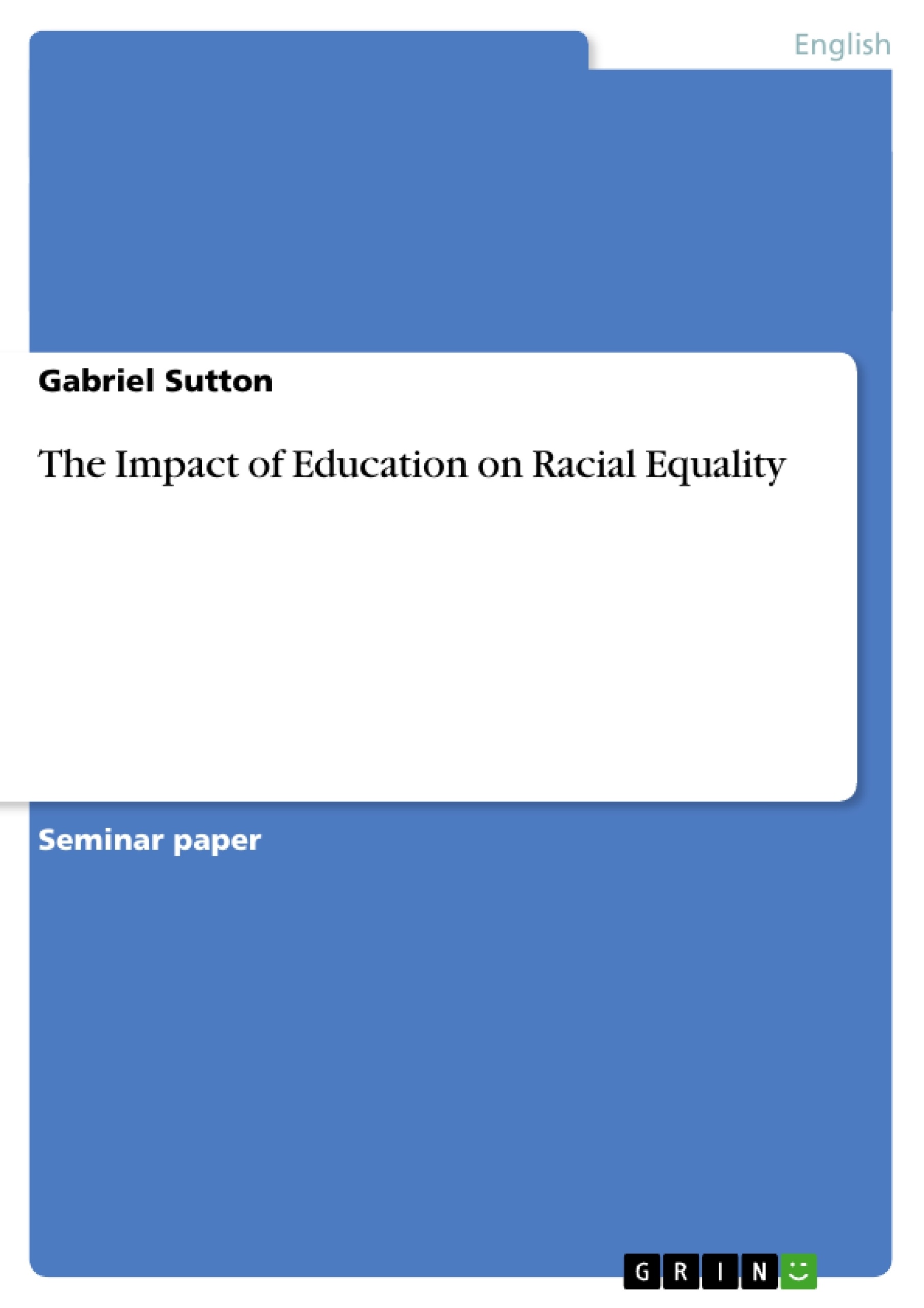If history has taught us one lesson, it is that knowledge is a powerful tool. Leaders have successfully guided countries into genocide by censoring educational materials. The power of knowledge has also been used in many positive ways, such as catalyzing the progress of the African American Civil Rights Movement. This essay uses African American prose to prove that education played an integral role in the struggle for racial equality.
Inhaltsverzeichnis (Table of Contents)
- Abstract
- The Impact of Education on Racial Equality
- The Power of Knowledge
- Frederick Douglass
- Ernest J. Gaines
- John Edgar Wideman
- Historical Context
- Douglass's Education
- Brothers and Keepers
- Conclusion
Zielsetzung und Themenschwerpunkte (Objectives and Key Themes)
This essay explores the impact of education on racial equality using African American prose as evidence. The author argues that knowledge and communication were vital tools for achieving equality in the struggle against racial oppression.- The Power of Education
- African American Literature as a Tool for Social Change
- The Role of Education in Achieving Racial Equality
- The Importance of Knowledge and Communication
- The Historical Context of African American Education
Zusammenfassung der Kapitel (Chapter Summaries)
- The introduction discusses the importance of knowledge and communication in the pursuit of equality, using the metaphor of the pen versus the sword. It defines equality as the equal access to social, economic, and political opportunities for all races.
- The chapter then uses the example of Frederick Douglass, who learned to communicate his ideas through writing, inspiring sympathy in Whites and fostering a sense of community and hope in Black Americans. Douglass's autobiography, *My Bondage and My Freedom*, details the realities of slavery and how education breaks down barriers for African Americans.
- Ernest J. Gaines's novel *A Lesson Before Dying* illustrates how education can provide perspective. The protagonist, Jefferson, learns to see the unfairness of the world as an opportunity for change with the guidance of Grant Wiggins. Through this process, Jefferson discovers his own power and shares this perspective with his peers.
- John Edgar Wideman's *Brothers and Keepers* explores the opportunities education offers individuals. The novel details the events leading to Robby's imprisonment, highlighting the contrast between his brother John's path of education and Robby's choices. The reader understands why education is a valuable path to consider.
- The chapter then examines the historical context of African American education, drawing on Professor James D. Anderson's book *The Education of Blacks in the South 1860-1935*. Anderson examines the historical milestones that catalyzed African American education, discussing the impacts of political, cultural, and economic discrimination, as well as the progress made by new academic institutions.
- The chapter continues by discussing Frederick Douglass's *My Bondage and My Freedom*, which details an ex-slave's journey towards intellectuality and emphasizes the importance of education. The author highlights the power of Douglass's work in motivating Black parents to prioritize education for their children.
- The chapter then explores Douglass's own struggles to gain access to knowledge, including the opposition he faced from his master and the resourcefulness he employed to learn. This knowledge ultimately led to his role as a figurehead in the Abolitionist movement.
- The final chapter examines John Edgar Wideman's *Brothers and Keepers*, focusing on the meaning of freedom. While Robby is physically confined in prison, the author emphasizes the freedom of his mind and the potential of education to break down physical and mental barriers.
Schlüsselwörter (Keywords)
This essay explores the themes of racial equality, education, African American literature, knowledge, communication, and the historical context of African American education. The essay uses the works of Frederick Douglass, Ernest J. Gaines, and John Edgar Wideman to illustrate how education can empower oppressed groups and contribute to social change.Frequently Asked Questions
How did education impact the African American Civil Rights Movement?
Education acted as a catalyst for social change, providing the knowledge and communication skills necessary to challenge racial oppression and foster community hope.
What role does Frederick Douglass play in this essay?
Douglass is used as a primary example of how gaining literacy allowed an ex-slave to communicate the realities of slavery and become a figurehead in the Abolitionist movement.
How is education portrayed in Ernest J. Gaines's 'A Lesson Before Dying'?
In the novel, education is shown as a tool to provide perspective and empower individuals to see unfairness as an opportunity for change rather than just a source of despair.
What does John Edgar Wideman's 'Brothers and Keepers' explore?
The book explores the contrast between a life of education and a life without it, highlighting how mental freedom can be achieved even when physical freedom is restricted.
What historical context is provided regarding Black education in the South?
The essay references James D. Anderson's work on the period from 1860-1935, discussing the impact of political and economic discrimination on the development of academic institutions for Black Americans.
What is the 'pen versus the sword' metaphor in the introduction?
It symbolizes that communication and knowledge (the pen) are often more powerful tools for achieving lasting racial equality than physical force (the sword).
- Quote paper
- Gabriel Sutton (Author), 2012, The Impact of Education on Racial Equality, Munich, GRIN Verlag, https://www.grin.com/document/209275



